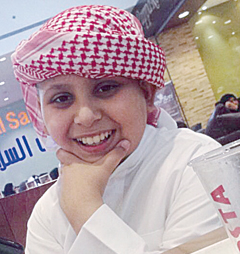Receives life-saving bone marrow transplant at London hospital
LONDON: On World Marrow Donor Day on 15th September, a Kuwaiti mother urges people in Kuwait and the region to learn about bone marrow transplants (BMT) and to become donors where possible. This comes after her son Salem, a 14-year-old Kuwaiti boy, had his life saved after visiting Great Ormond Street Hospital for Children in London (GOSH) for a bone marrow transplant. "I brought my son to GOSH because we weren't able to receive further treatment in Kuwait and doctors were saying there was no more hope," Salem's mother explains. "I almost lost hope but GOSH saved his life. I feel so emotional and grateful."
Salem suffered from Acute Lymphoblastic Leukemia which had relapsed through standard treatment and was subsequently transferred to London hospital, GOSH, which treats 1,500 children from the Middle East every year. The bone marrow transplant (BMT), conducted at GOSH, allowed the hospital to give Salem high-dose chemotherapy to destroy his cancerous cells.
However, the high dose chemotherapy also destroys the healthy cells inside the bone marrow. The bone marrow transplant (BMT) is important as it is responsible for making stem cells. By giving Salem stem cells from a healthy unrelated donor, this allowed the bone marrow to recover from the intensive treatment. Stem cells can turn into different types of blood cells. This includes red blood cells to carry oxygen around the body, white blood cells to fight infection, and platelets to help stop bleeding.
Professor Paul Veys, Director of the Bone Marrow Transplant Unit at Great Ormond Street Hospital in London (GOSH), treated Salem. Professor Veys is an internationally renowned expert in BMT and he explains the importance of expanding registries with bone marrow donors. "Tissue matching is closely linked with ethnicity and Arabs are under-represented on the donor panels. It is therefore vital that we expand the registries with donors from all types of ethnic background so that the chance of finding a matched donor can be improved particularly for patients from the Middle East," explains Professor Veys.
'It saved my son's life'
Since her time at GOSH, Salem's mother has become a passionate advocate of bone marrow donation and increasing people's awareness of its importance in Kuwait. "Bone marrow donation saves people's lives. It saved my son's life. I want to encourage people back home in becoming more educated about bone marrow donation and understand why it is so important. Unfortunately, people are not aware in Kuwait as it's not really talked about. I am really ready to contribute here."
Like Salem's mother, Lindsey Young, Bone Marrow Transplant Clinical Nurse Specialist at GOSH, also wants to tackle misconceptions that blood marrow donations are painful. "This is not the case at all", explains Lindsey. "Stem cells can be collected in two ways either through peripheral blood stem cell (PBSc) or bone marrow harvest. Bone marrow harvests are usually carried out under general anesthetic (GA) and are often a day case or overnight stay in hospital.
As they are performed under GA you don't feel any pain during the procedure but might feel slightly bruised at the area and tired for a few days following it. Alternatively, PBSc are collected directly from a large vein and involves a series of injections to make the stem cells multiply into the bloodstream. Some people report flu-like symptoms from the injections, but these are usually mild and go within a few days."
Lindsey worked with Salem and his family during his treatment and nominated Salem to take part in Superhope; an exciting campaign designed to promote Positive Mental Attitude (PMA) for children with cancer which will be officially launched on October 1st. "Salem has had a really long medical journey at GOSH starting in 2013 and cumulating in a BMT in 2017. I nominated Salem to take part in Superhope as I thought this would give him a chance to do something non-medical and really immerse himself back into normal childhood play. I was really excited to see what he had come up with and knew he would gain so much from the experience."











